In ancient times, there was a town on the banks of the Tungabhadra River. A Brahmin named Atmadev lived there with his wife, Dhundhuli. Atmadev was proficient in his duties, but Dhundhuli was a talkative, miserly, and quarrelsome woman. They had everything at home except children, which made Atmadev unhappy. One day, he left home and went to the forest, where he met a sage. Atmadev tearfully shared his sorrow with the sage, saying, "Because I have no children, my ancestors accept my offerings worryingly, and the gods receive my donations unhappily. Even my cow is barren, and my trees bear no fruit. Childless, I have come to end my life in sorrow." The sage felt pity and said, "One must endure the results of their actions. Give up your desire for a son." But the Brahmin disagreed. Then the sage gave him a fruit and said, "Give this to your wife. If she follows the rules of truth, cleanliness, compassion, charity, and eating only once a day for a year, she will conceive a son."
The Brahmin took the fruit home and gave it to his wife, explaining everything. But Dhundhuli, being cunning, did not want a child. She cried and went to her friend, expressing her fears, "If my belly swells, I won't have energy, and if thieves come, how will I run? Food will not taste good, and what if the child never leaves my womb like Shukadev Paramhans?" Her friend advised her not to eat the fruit, and Dhundhuli agreed, lying about it. One day, her sister visited and shared her own story. The sister, who was pregnant, suggested, "When my child is born, I will secretly give it to you. Give my husband some money in return. For now, feed the fruit to the cow."
Dhundhuli did as suggested. Sometime later, her sister gave birth to a son and secretly handed him to Dhundhuli in exchange for money. Atmadev was overjoyed and named the child Dhundhukari. Three months later, the cow gave birth to a human-shaped child with ears like a cow. He was beautiful and had a radiant complexion like gold. Atmadev, delighted, performed his birth rites and named him Gokarna.
As time passed, both children grew up. Gokarna became a great scholar and wise man, but Dhundhukari turned out to be very wicked. He did not follow the Brahminical conduct of bathing and cleanliness, nor was he careful about his diet. He was always angry and collected all sorts of bad things. Dhundhukari stole and harboured enmity with everyone. He would secretly set fire to others' houses and drop children into wells. He became addicted to violence, always carried weapons, and tormented the blind and the helpless for no reason. Falling into the trap of prostitutes, he squandered all his father's wealth.
One day, he beat his parents, took all the household items, and left. With all his wealth gone, Atmadev cried bitterly, lamenting, "It would have been better if his mother had remained barren. Where will I go now? Who will save me from this crisis? Alas, such a great calamity has befallen me. I will surely die of this sorrow."
Gokarna consoled his father with teachings on detachment, saying:
Asarah khalu sansaro duhkha-rupi vimohakah,
Sutah kasya dhanam kasya sneha-vaanjvalate'nisham.
"Father, this world is transient. It is extremely sorrowful and deceptive. Who is whose son? Who is whose wealth? The person attached to the world burns day and night like a lamp." (Bhagavat Mahatmay 1-4-74)
Neither Indra nor an emperor experiences true happiness; only a detached, secluded sage does. Abandon the ignorance of 'this is my son.' Attachment leads to sorrow. This body will perish anyway. So, renounce everything and go to the forest. Impressed by Gokarna's words, Atmadev decided to leave for the forest and asked his son to explain in detail what he should do there. He admitted his foolishness, having been bound by the ties of affection and trapped in the darkness of household life. Gokarna advised, "Father, this body is a mass of bones, flesh, and blood; stop considering it 'I' and do not regard your wife and children as 'yours.' View this transient world without attachment to its objects, seeing them impermanent. Embrace detachment and devote yourself to the worship of the Shree Krishna. Serving Him is the greatest duty; take refuge in it always. Abandon all worldly duties. Always serve the sages. Do not let the desire for pleasures come near and, as soon as possible, stop thinking about others' virtues and faults, focusing only on the service and leelas of Shree Krishna." Influenced by his son's words, Atmadev left home and embarked on his journey to the forest. Although he was sixty years old then, his mind was firm. By serving and worshipping God day and night, he attained Bhagwan Shree Krishna.
After his father left for the forest, Dhundhukari became even more unruly. Now, without his father's control, he began to torment his mother. Once, while beating her, he demanded, "Tell me where the money is, or I will burn you with a hot rod." Suffering from her son's atrocities, Dhundhuli left home one night and, on the way, fell into a well and died. At that time, Gokarna also set out on a pilgrimage. He was detached from the atmosphere of the house, with neither friends nor enemies.
With no one left at home, Dhundhukari brought five prostitutes to live in the house. He spent day and night indulging them and fulfilling their desires. One day, the women demanded many ornaments. Dhundhukari, so infatuated with them, had no fear of death. He went out at night to steal the jewellery. After gathering jewels and clothes from everywhere, he brought them home, but the women thought he would be caught by the king one day and they would also be implicated. So, one night, they tied a rope around his neck while he was sleeping and tried to strangle him. When he did not die, they cruelly stuffed his mouth with burning coals, killing him. They then buried his body in a pit and, after a few days, took the wealth and fled. Dhundhukari became a restless Preta (spirit of the dead), constantly wandering in all directions like a whirlwind. Suffering from hunger, thirst, cold, and heat, he roamed, crying, "Oh God! Oh God!" seeking shelter but finding none.
Sometime later, Gokarna heard about Dhundhukari's death. He performed his Shraddha (rituals for the deceased) at Gaya and other holy places. After visiting all the pilgrimage sites, Gokarna returned to his town and stayed quietly in his house at night. Seeing his brother asleep, Dhundhukari appeared in a terrifying form and began to haunt him. Dhundhukari, unable to speak, wept and gestured. Gokarna recited some mantras and sprinkled water on him, alleviating some of his sins and allowing him to tell his story and ask for a way to liberation.
Even after performing Shraddha at holy places, Gokarna was surprised that Dhundhukari had not attained liberation. However, Gokarna assured him and sent him away. The next day, the townspeople came to meet him. Among them were some knowledgeable scholars who consulted the scriptures. They decided to seek guidance from Surya Narayana (the Sun God). Gokarna praised Surya Narayana, who then advised that only the recitation of the Bhagavat Puran for a week could grant liberation.
Gokarna organised a Bhagavat Katha, which attracted people from far and wide. When Gokarna began the recitation, Dhundhukari's Preta also arrived, searching for a place to sit. He noticed a bamboo with seven knots and entered the lowest hole. Being in the form of air, he could not sit outside. Gokarna began the recitation, and at the end of each day's session, the lowest knot of the bamboo cracked, and Dhundhukari moved up a knot. By the end of the seven days, all seven knots had broken.
After seven days, Dhundhukari was purified by listening to the Bhagavat Puran and was freed from his spirit form, emerging with a divine appearance. His body was dark like a cloud, adorned with yellow robes and garlands of tulsi, with a beautiful crown on his head and charming earrings. He immediately bowed to his brother Gokarna and said, "Brother, you have mercifully freed me from the torments of the spirit form."
In an assembly of gods and scholars, it is said that being born in Bharatvarsh (India) and not listening to the Bhagavat Puran makes one's life futile. Simply nourishing the perishable body is of no use.
Dhanya bhagavati varta pretapida vinashini,
Saptaho'pi tatha dhanyah krishnalokaphalapradah.
Kampante sarvapapani saptahashravane sthite,
Asmakam pralayam sadyah katha cheyam karishyati.
Ardram shushkam laghu sthulam vangmanah karmabhih kritam,
Shravanam vidahetpapam pavakah samidho yatha.
"Blessed is the Bhagavat discourse that destroys the pain of ghostly bodies. Blessed is the Bhagavat Saptah, which grants the fruit of attaining Krishna's abode. All sins tremble at the recitation of the Bhagavat Katha, knowing it will soon destroy them. Just as fire burns all kinds of wood, the Bhagavat Katha burns all sins committed by thought, word, and deed."(Bhagavat Mahatmay 1-5-53, 54, 55)
Dhundhukari said that the body comprises bones, veins, and nerves, covered with flesh and blood and enclosed in skin. The body emits a foul smell from each pore and is a vessel for excreta. In old age and sorrow, it becomes the home of diseases and is constantly troubled by desires. It is never satisfied, and even holding it is a burden. It can be destroyed in an instant. When burned, it turns into a heap of ash. With such an unstable body, why doesn't man strive for divine and eternal goals? Those who have not received the Bhagavat Katha are like bubbles in water and mosquitoes in living beings, which are born only to die. If the knot of bamboo can be untied by listening to the Katha, then indeed, the knot of the human heart can be undone, erasing all doubts and actions.
When Dhundhukari was speaking, a divine vimana arrived with God's servants (parshads) to take him to the divine abode. In front of everyone, Dhundhukari boarded the vimana. Gokarna then asked the Parshads why they were not taking everyone to God's abode, as many other listeners were present. The Parshads explained that the difference in outcomes was due to the difference in their listening. Although everyone had listened to the Bhagavat Katha, they had not contemplated it like Dhundhukari. This resulted in different outcomes despite performing the same action together. Dhundhukari listened to the discourse after fasting for seven days and meditated and contemplated on the subject with a steady mind.
Adridham cha hatam jnanam pramadena hatam shrutam,
Sandigdho hi hato mantro vyagrachitto hato japah.
The knowledge that is not firm becomes useless. In the same way, listening without paying attention, chanting mantras with doubt, and wandering the mind here and there do not yield any results. (Bhagwat Mahatmya 1-5-73)
A country without Vaishnavs, where food offered as Shraddha is given to unworthy people, and charity is bestowed upon individuals who do not know the scriptures and Vedas, such a place, along with a family with questionable morals, is bound for ruin. On the other hand, by following principles like faith in the words of the Guru, cultivating humility, conquering the flaws of the mind, and focusing the mind on the sacred story, one can truly reap the rewards of attentive listening.
The Parshads further revealed that if these listeners listen to the story of Shreemad Bhagavat again, surely everyone will attain the abode of God and God Himself will come and take Gokarna to Golok Dham. Saying this, all the Parshads went to the divine world along with Dhundhukari while singing Hari Kirtan.
In the month of Shravan, Gokarna embarked on another recitation of the Bhagavat Katha for one week, and the audience eagerly tuned in again. It all built up to the grand finale, where Shree Krishna Himself appeared with a divine Vimana full of devotees. He embraced Gokarna and manifested Himself among them. The astounding conclusion saw all the creatures in the village, including the dogs, being ushered to the abode of God, akin to where even the Yogis cannot go.
Summary: JKYog India Online Class- Shreemad Bhagavat Katha [Hindi]- 21.06.2024

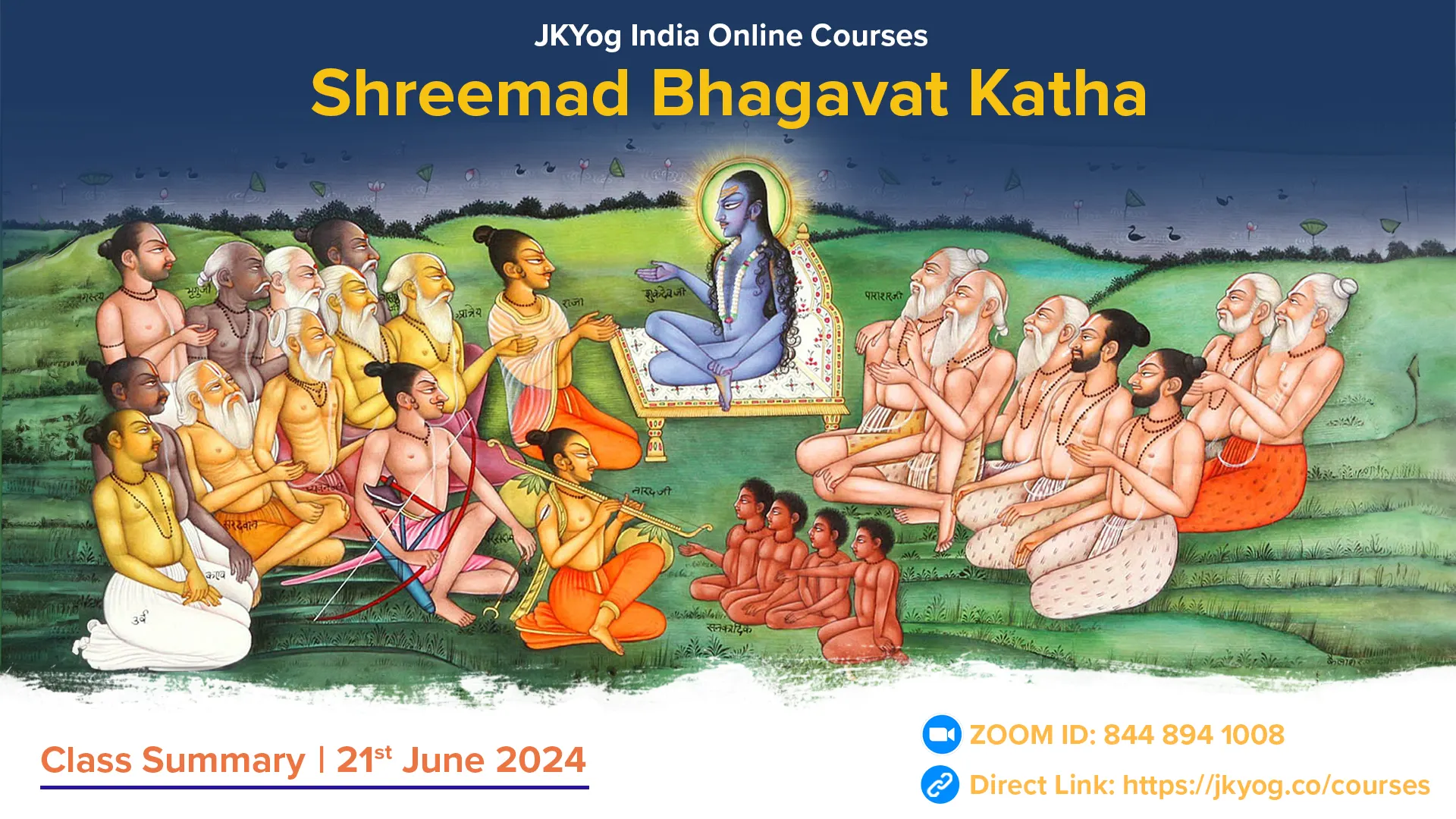

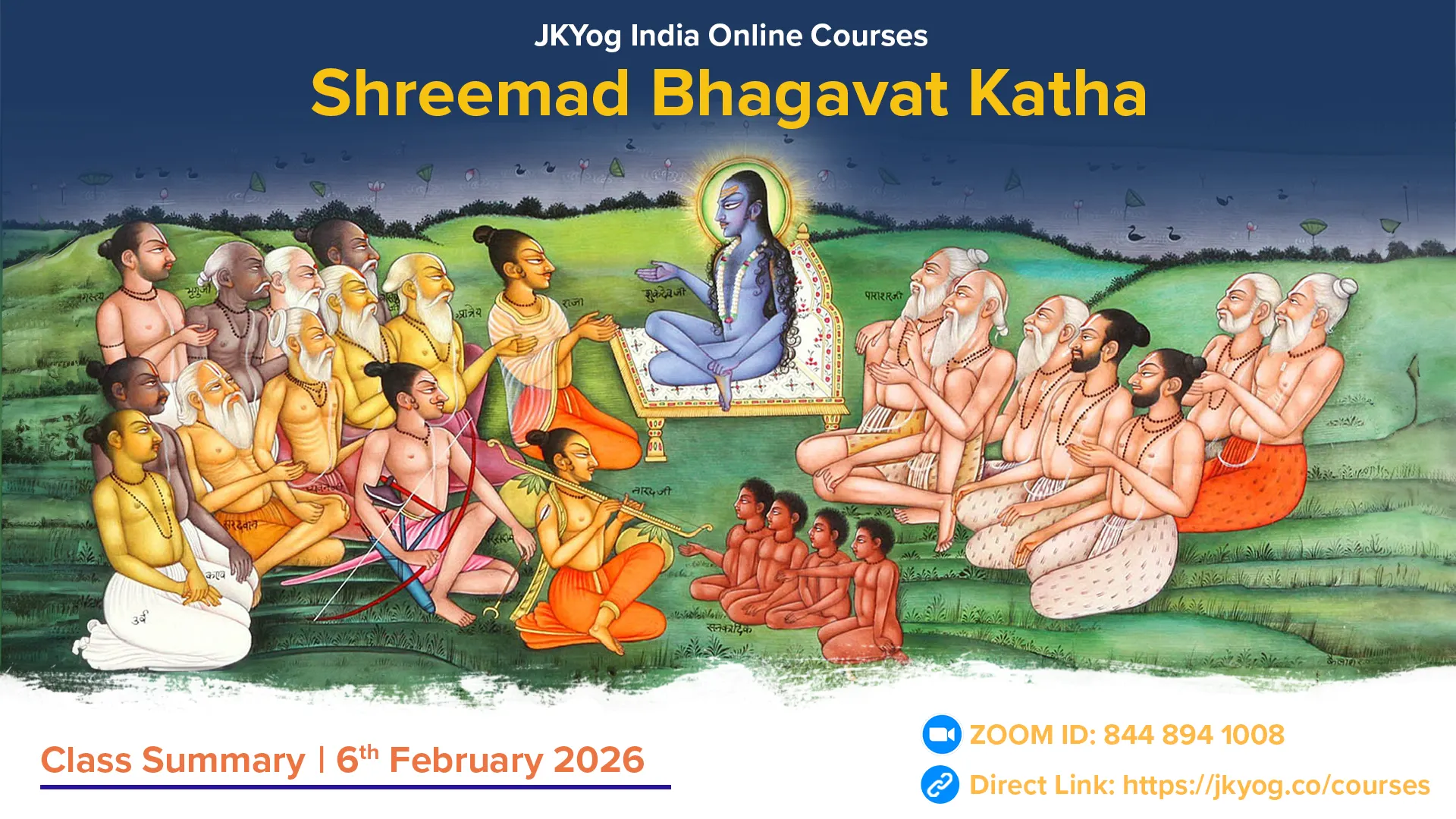
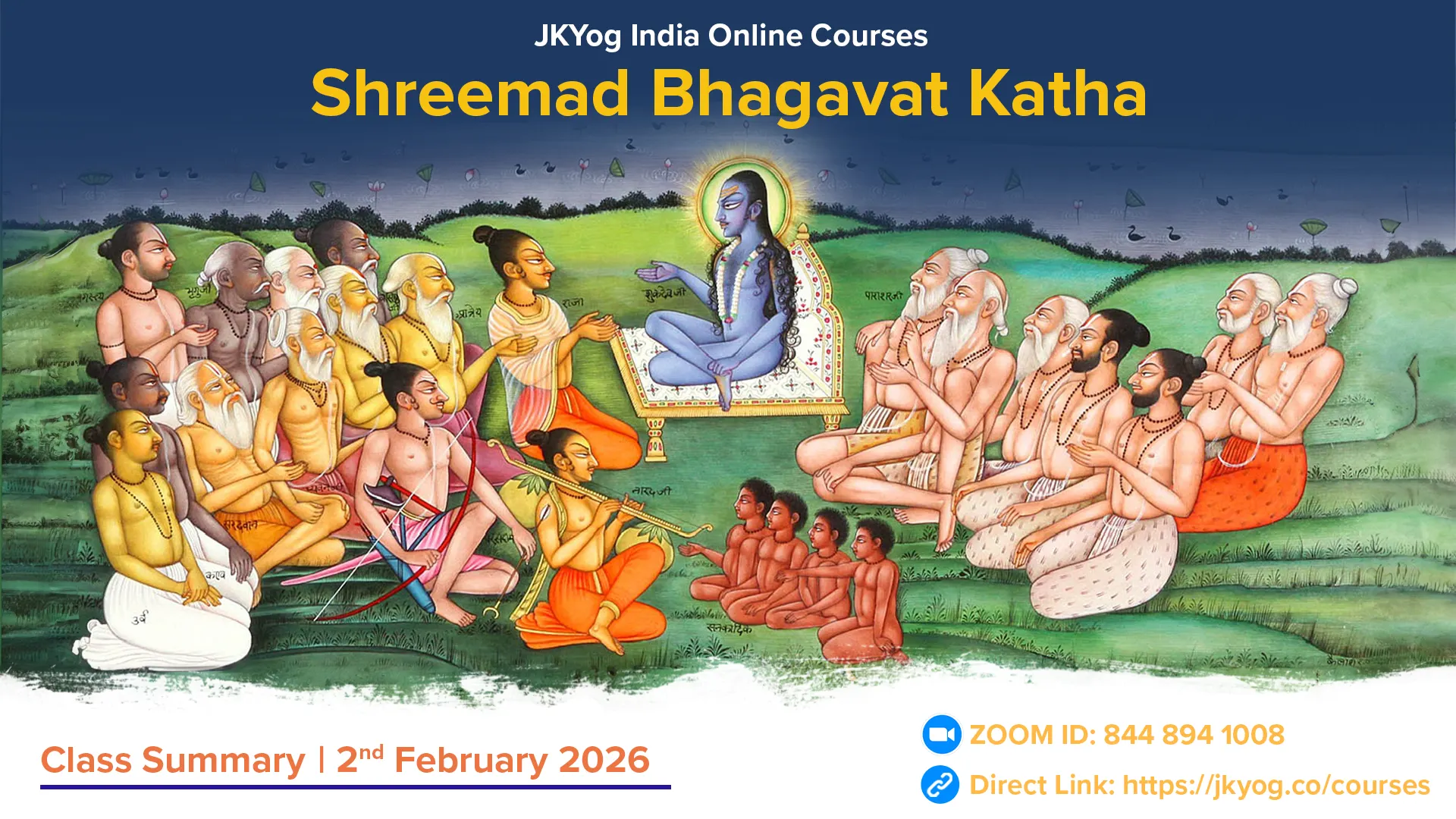
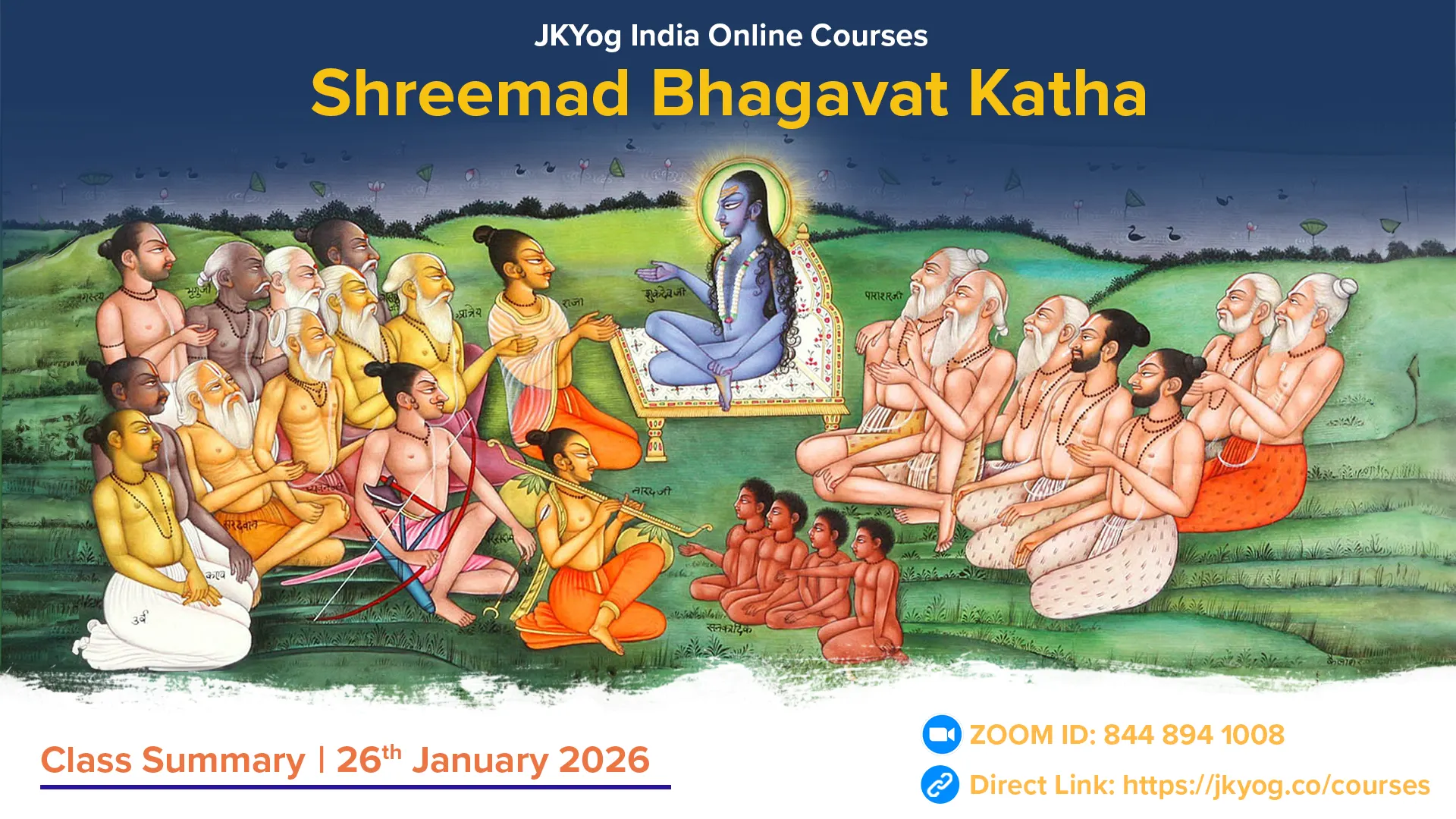
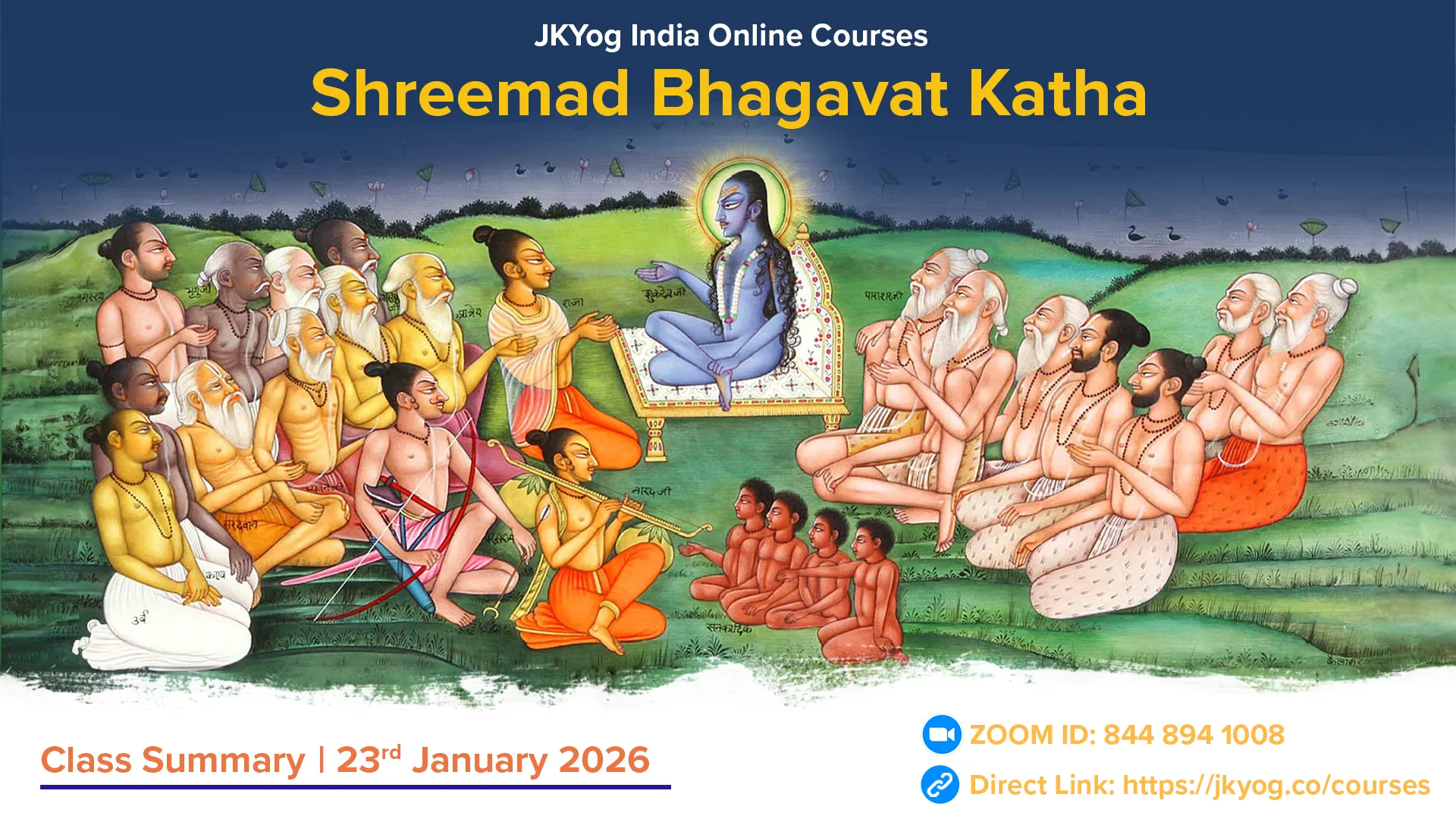
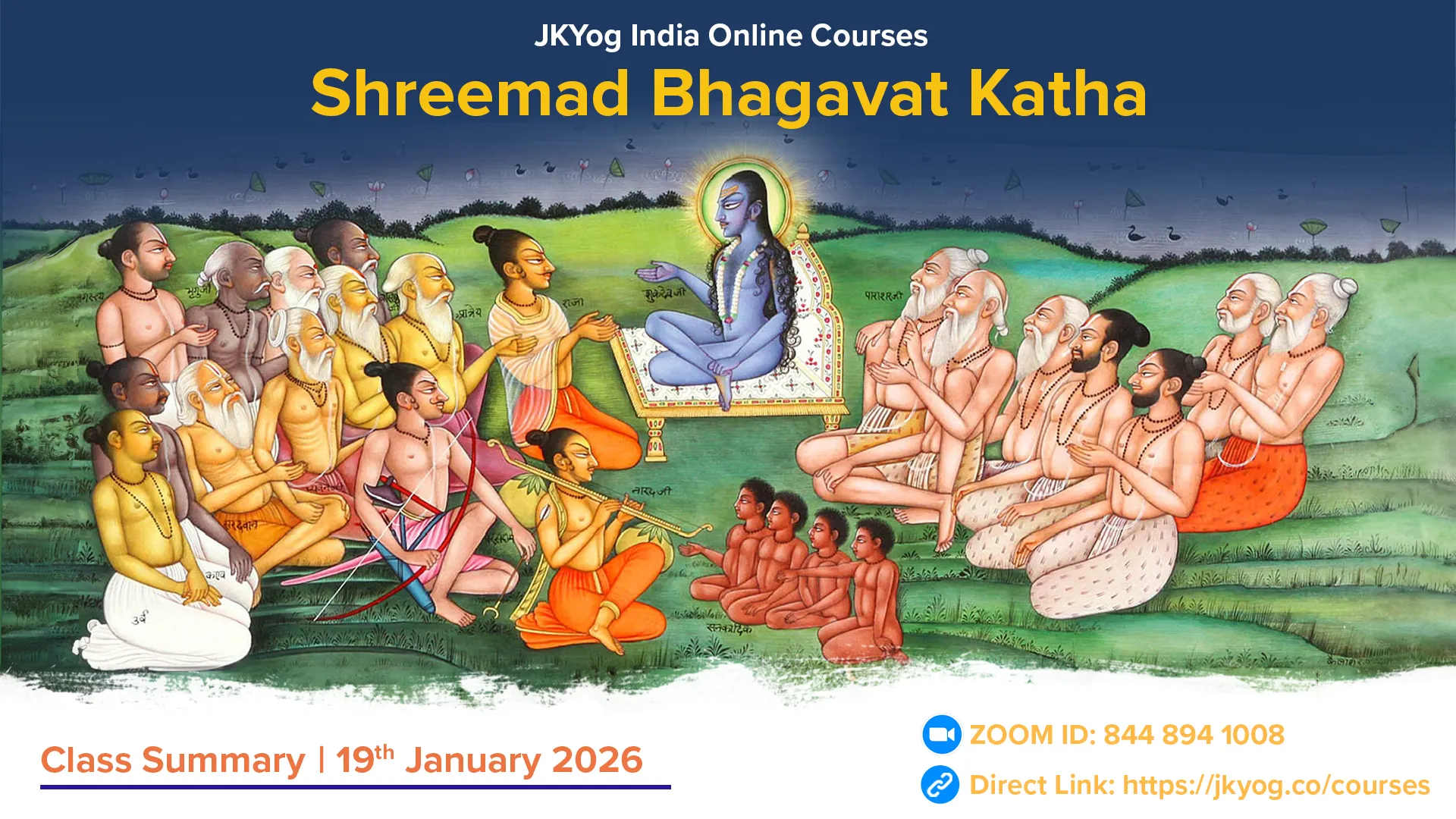
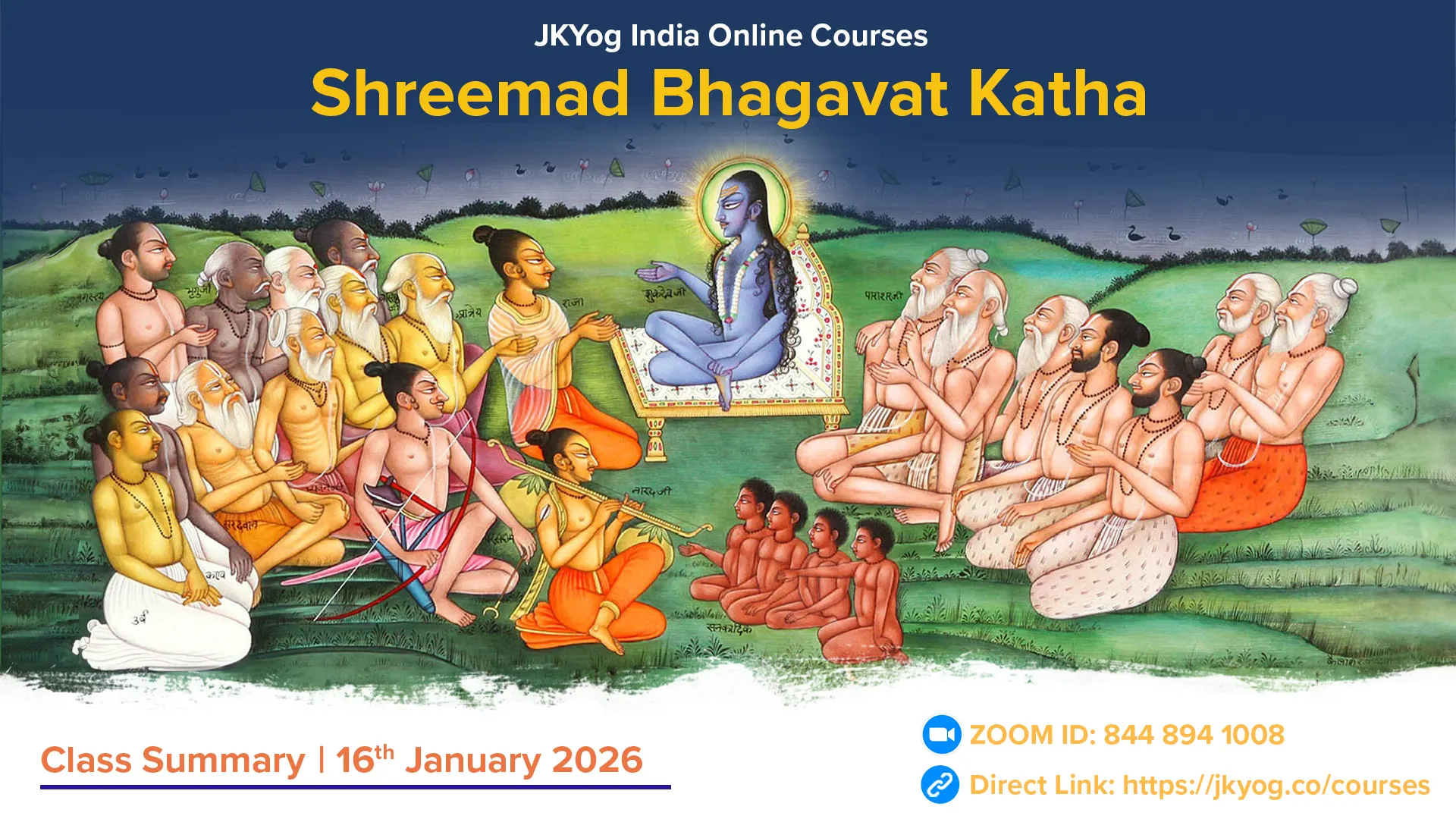
What our Participants say